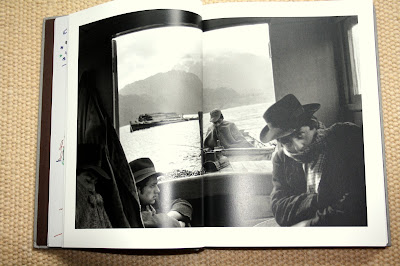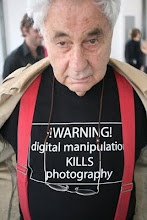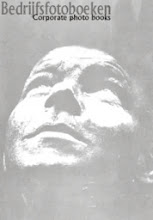This week's book of the week pick comes from photographer, former writer of the influential 5B4 photobook blog and current TIME LightBox contributor, Creative Director of errata editions and founder of the new 40x50 Editions site, Jeffrey Ladd. Ladd selected the self-titled Sergio Larrain published by Aperture/Thames and Hudson/Xavier Barral.
"Having been a self-proclaimed Sergio Larrain junkie for long while, I heard about and waited patiently for this book’s release date. I wondered if there would be images that haven’t been published before. I didn’t realize that 1/2 the book would be of images new to me - and the best part is, much of it is even better than the work I had known." -- Jeffrey Ladd
Sergio Larrain
Photographs by Sergio Larrain
Edited and with text by Agnès Sire Essay by Gonzalo Leiva Quijada
8 1/4 x 11 1/2 inches ca. 420 pages, 200 duotone photographs Clothbound 978-1-59711-259-8 October 2013 Designed by Xavier Barral
A notoriously reclusive artist, Sergio Larrain has nonetheless become a touchstone for those who have come to know and love his work, including authors Roberto Bolaño and Julio Cortázar. Celebrated by Henri Cartier-Bresson, his contemporary and a co-founder of Magnum, Larrain’s experimental process yielded images that transformed the fixed nature of the medium. His images have left generations of viewers in awe of the simultaneous serenity and spontaneity that a camera can capture—when placed, that is, in the hands of an artist with such rare meditative passion. “A good image is born from a state of grace,” the artist once explained. Sergio Larrain, a selection of over two hundred images, rectifies Larrain’s omission from the canon of significant twentieth-century photographers, and combines his work in Latin America with photographs taken in Europe. Following a creatively fertile period in the 1950s and ’60s, Larrain put away his camera and devoted himself to the solitary pursuit of spiritual mysticism, a decision that further contributed to his reputation as a romantic, a “fatal personage,” in the words of Bolaño. Created with the encouragement of Larrain’s family, the book is sumptuously produced, designed by Xavier Barral, and edited by Agnès Sire, who enjoyed a long correspondence with the photographer and has worked with Magnum on preserving his photographic estate.
Sergio Larrain (1931–2012, born in Valparaiso, Chile) grew up in Chile, but left at age eighteen to study at the University of California, Berkeley. Upon his return he began taking photographs in the streets of Santiago and Valparaiso; the early purchase of two images by the Museum of Modern Art, New York, reassured him in his chosen profession. Impressed by Henri Cartier-Bresson’s photographs, Larrain presented the photographer his work on los abandonados (street children in Santiago) during a trip to Europe. Cartier-Bresson then invited Larrain to join Magnum in 1960; around this time he also began what would become a legendary project on Valparaiso with a text by poet Pablo Neruda. Unsure if he was suited to working for the press, Larrain retreated to the Chilean countryside and dedicated himself to yoga, meditation, and drawing until his death in February 2012.
After earning a Ph.D. in philosophy and aesthetics, Agnès Sire (editor) worked at Galerie Alexandre Iolas in Paris before joining Magnum Photos as an art director. In 2004, she became director of the Fondation Henri Cartier-Bresson, where she also oversees exhibitions and publications. She instigated the publication of Sergio Larrain’s works Valparaiso (1991) and London 1958–59 (1998), and was an associate curator of the photographer’s exhibition at Instituto Valenciano de Arte Moderno in Valencia, Spain.
Gonzalo Leiva Quijada (essay) is a professor of philosophy and aesthetics at the Instituto de Estética, Pontificia Universidad Católica de Chile, Santiago. He is also a curator and a specialist in the history of Latin American photography.
- See more at: http://www.aperture.org/shop/sergio-larrain-books#sthash.rtJ4rbBH.dpuf Mr. Sergio Larrain,
Huerfanos 725, entre piso,
Santiago de Chile.
Dear Sergio Larrain:
I have intended to write you since the exhibition opened, but most of my time has been taken up by looking at portfolios of work which people have brought in. There seems to have been more productivity this summer. However none of it is able to throw even the most transparent shadow over your own work which is very handsome on the walls and takes on new values and perspectives when seen in an exhibition.
It seems I have known these pictures so long now and yet it is hardly more than a year. I shall always be grateful to Shirley Hicks for sending El Rectangulo en la Mano, nor shall I forget the first night I spent in looking at it again and again. Your personal nearness to the subjects had at last made insignificant the great flood of “social” photographs by which we have been overcome during the last few years. You are always behind the picture, and not before it , and it is easy to see clearly, without interruption, the world you reveal. You offer no college-patented remedies with sociological labels for the human existence: and your people have begun with Montaigne’s realization that the reason for living is to live. There is hope for them, whereas the so-called “underprivileged” of other places seem beyond meeting the vicissitudes of their lives because they expect to fill the void within them from outside. There has been nothing like the sympathy your people touch upon, except-perhaps-the children who are found in the pages of Genet’s early book, Le Miracle de la Rose. I want to write you again before long and say more to you about them…
My only disappointment is that you are not here to see the show. I have wanted to know you and talk to you ever since the first time I opened El Rectangulo en la Mano. I am sorry I am so dilatory about writing letters and that I am such a poor hand at writing. I give up too much to the experiencing of my own responses to the things I admire…
In your letter, there was the question of the publication of a book of your photographs. I am at a loss as to answering this, knowing practically nothing of these matters except that all the details of them are difficult. It is a time in which “picture editors” are tyrants [who] underestimate the possibilities of their public and discard everything which throws new light on neglected values. Any number of books will be published of excellent reproductions of so-called “non-objective” photographs (that sterile paradox), all of which look alike. Have you ever thought of a publication in Japan (Dennis Stock’s James Dean book appeared there) which might be circulated in this country by a firm like Tuttle in Vermont? And you have never had a portfolio in the Swiss DU or CAMERA INTERNATIONAL. I will give all this more thought and write about it later. It seems that even when books of photographs are printed, the publishers make use of such poor distribution media that there is no wonder they sell so poorly.
I am sorry not to send a letter today that expresses more about your work. You are very much in my mind and perhaps this is the reason why [I] can say so little of what I want to say. You will hear from me again and I am sure we will meet before long. I do want to mail this to you at once and let you know how grateful I am for your having accomplished a work which is already so rich and which promises even more. Added to this gratitude for having given us the opportunity to show it here.
Sincerely,
Hugh Edwards, Curator of Photography.

























Geen opmerkingen:
Een reactie posten